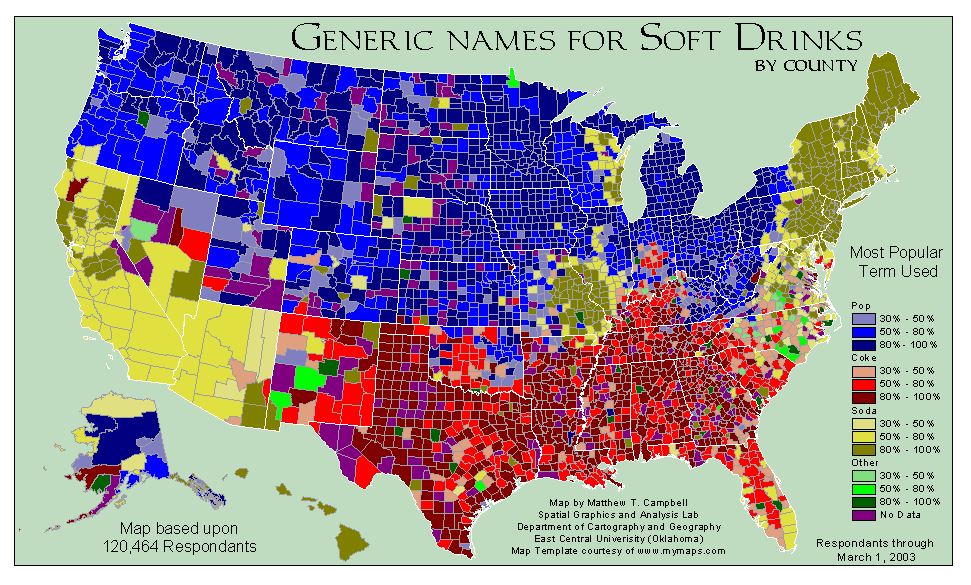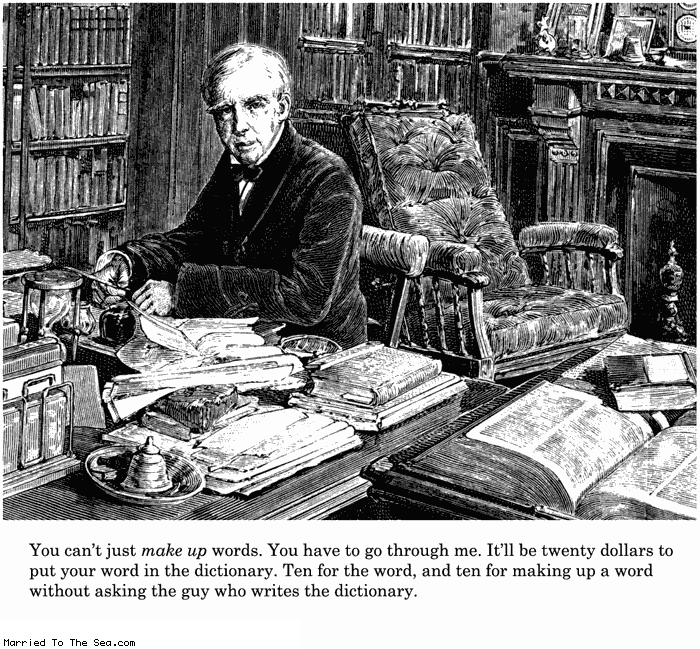Lexicon
"Vic and Nat'ly" - New Orleans Yat Accent Cartoons
This video is an interview with Bunny Matthews, the creator of "Vic and Nat'ly", an iconic New Orleans cartoon series with two characters who are great examples of the New Orleans "Yat accent". In the video, Matthews describes how he conceived of Vic and Nat'ly. If you look up these comics, their speech is written to resemble the Yat accent. [Published on 08-03-2010]
COVID has led to creation of 1200+ new words in German
This tweet explains how COVID has led to the creation of over a thousand new words in German. The author also provides a link below to a website where these words have been compiled. [Published on 02-21-2021]
Languages affect how we physically perceive the world
A recent study has proposed that humans have different ways of perceiving the world around them depending on the language they speak. For example, when native English speakers were asked to describe the taste of bitter-flavored water, responses varied from "bitter, to salty, sour, not bad, plain, mint, like ear wax, medicinal, and so forth." Meanwhile, when Farsi speakers were asked to describe the same drink, it was nearly unanimously "talkh," the Farsi word for bitter.
Some languages are more equipped in describing smells, for instance, than other languages -- and that affects how we, as users of language, perceive the world around us.
[Published on 02-27-2019]
Analysis of billions of Twitter words reveals how American English develops
Researchers at U. Birmingham analyzed almost 1 billion twitter posts in English to find new and common emerging words in the English language.
The distribution of the most popular words
 Play video
Play videoNot really related to what we've been studying but there's an interesting pattern in how frequently common words appear seemingly similar amongst many languages. It's a Vsauce video though so.
What Makes a Dialect a Dialect: The Roots of Upper Peninsula English
 Play video
Play videoHistory and development of English in Michigan's Upper Peninsula, a regional dialect also known as Yooper.
Word Choice - Friends
 Play video
Play videoIn this episode Joey thinks that the way he speaks or writes is what matters. He starts to think this way when someone told him he should change. He wants to change because of important matters, like writing a letter for an adoption agency. Joey changes his word choices to seem smarter and more distinguished. He deviates from his regular language or vocabulary and it doesn't exactly work out for. What I take from this is that people should embrace their language and personalities with it and not change just because you want to be viewed a different way in society.
Subways
This meme demonstrates the use of the term "subways" to mean footlong submarine sandwiches, which are strongly associated with the restaurant chain Subway. Lexical innovation!
Why Germans Can Say Things No One Else Can
 Play video
Play videoThis video talks about language and it's ability to allow for thought, emotion, and the expression of feelings. It talks specifically about the German language and how they have a wide variety of words they can use to better describe a situation or feeling other languages might not be able to do as effectively. It explains many examples of this, along with the appropriate meaning in English. Having a different set of words to think with and use allows for a wide variety of unique knowledge one can obtain. This video just scratches the surface of the importance of language, and how language in our lives can change the way we think and interpret the world around us.
An Illustrated Guide To Weird British Expressions
If you asked someone what’s Great Britain's most peculiar trait, they’d probably tell you it’s their odd choice of expressions. Here's a curation of a series of strange, weird and odd British expressions illustrated. [Published on 11-07-2016]
Steven Colbert's new word
 Play video
Play videoSteven Colbert has a long history of creating his own words. Recently he did a spin on one of his originals by creating, "Trumpiness." Which means to believe in something even if you know it isn't true or if it lacks evidence. Colbert's description describing how Trump supporters know that Trumps comments/statements aren't true, and don't care.
How Trump chooses his words
 Play video
Play videoI found this video of Donald Trump quite interesting and relevant. This video clip shows Trumps visit on the Jimmy Kimmel show while giving us a look into “How Donald Trump Answers A Question”. In other words, the author of this clip analyzes Donald Trumps speech and gives viewers a linguistic perspective on Trumps word choice and language. While analyzing Trumps speech, the author of the video, “Nerdwriter1”, takes a look at Trumps word choice, syllable count, word rhythm, sentence structure and more. He then ties his analysis with a study done by the Boston Globe, which diagnosed past Presidential speeches. This video gives reason for cluing into peoples words, especially ones with influence and worldly impact like Donald Trump.
Bazinga
 Play video
Play videoThe word 'bazinga' was made popular by the character of Sheldon in The Big Bang Theory, but it is now frequently outside the show as well. For example, John Oliver recently used it in his phenomenally popular "Make Donald Drumpf Again" skit. It demonstrates the phenomenon of an essentially made-up word coming entering into popular usage, outside of its original context. Also, interesting to note is that in the clip, they start using it as a noun, once its meaning has been solidly established as an exclamation.
Trump Debate
 Play video
Play videoThis is an example of performance, as Donald Trump places an emphasis on the way he delivers his response to Jeb Bush. His delivery and the way he speaks is very aggressive and confident in tone. His style of speech, that is in a very straight forward, relaxed manner, has resulted in his popularity around the country. He tells it as it is and throws the "political correctness" out the door in all of his debates.
When Dirty words first appeared in English
A chart of when slang terms for genitalia and sex first appeared in English. [Published on 12-19-2014]
"Phrenetic Phonetics"
A little comic on how words got their meaning.
Debate about who gets to use a word
cw: discussion of racial slur
This is a CNN interview between a white commentator and a black rapper named Trinidad. They're debating about use of the n-word.
I find the controversy about who gets to use certain words fascinating. I hear a power & privilege conversation most often, as well as an "in-group" vs "out-group" conversation. [Published on 03-17-2015]
Do You See What I See?
From about 1:20-5:00 the film crew focuses on the Himba tribe, who have half as many color terms as we do. This seems like it gets at the idea in the Bourdieu chapter that language without objectification and codification exists to have functionality. It also seems to me that finding out related phenomena like this is another benefit of not being prescriptive in our language use. [Published on 08-11-2011]
At the Super Bowl of Linguistics, may the best word win
New York TImes coverage of the American Dialect Society's Word of the Year vote, in which the first ever hashtag, #blacklivesmatter, was selected as the Word of 2014. [Published on 01-16-2015]
Lexicon of Baltimorese
List of lexical items considered unique to Baltimorese, includes some altered spellings to demonstrate phonological features.
Time Magazine's "Which Words Should We Ban?"
The banned word poll consists mainly of slang found in youth culture and in AAE, and while the article suggests the words in question are new and over-exposed, the lexical items in AAE have long been in use. The descriptions for the words and slang mock those who use them, heavily targeting African American youth. [Published on 11-12-2014]
Why language about race changes over time
An NPR piece on changing terms for racial and ethnic categories, but really is about how terms change over time through process of pejoration, or what Pinker calls the "euphemism treadmill." [Published on 11-10-2014]
The n-word: An Interactive Feature
An interactive piece on use of the n-word in contemporary American English, with interviews from varying perspectives and on varying aspects of the term's use, including in- vs. out-group usage, reclamation, and its use in hip hop culture. [Published on 11-10-2014]
NPR: A quick guide to Liberian English
A short piece on lexicon used in Liberian English, with some history on the variety from John Singler. [Published on 11-10-2014]
Bandersnatch Cummerbund
Not reeeeally (at all) related to what we've been talking about in class, but I thought this was a really cool and thorough look at how we (or a generator) make "Benedict Cumberbatch" synonyms, and what features they often have to work and actually be funny.
When Slang Becomes a Slur
Linguist Geoffrey Nunberg, who testified in the trademark trial over the name of the football team the Washington Redskins, argues that the term remains a slur and that the team name should be changed. [Published on 06-23-2014]
Listen: How to Speak with a certain Southern Twang
Walt Wolfram discusses the Appalachian variety in North Carolina in an audio clip for North Carolina public radio, including features like [Published on 06-09-2014]
The Origins of Office Speak
An article that describes the evolution of "office speak" or business jargon, in American English, across the twentieth and twenty-first centuries. [Published on 04-24-2014]
Mapping how America Talks
The Atlantic compiled audio recordings from the Harvard Dialect Survey and the maps of Jonathan Katz from the same dataset into a video.
conflicting definitions of "terrorism"
Describes different definitions of "terrorism" in use by U.S. government agencies, the general U.S. public, and other places.
Radiolab: Why isn't the sky blue?
A 2013 Radiolab episode that begins with a study demonstrating that Homer had no word for blue, and goes to discuss research on the ordering of cross-linguistic color terminology, a classic area of study in early theories of linguistic relativity.
Buzzfeed: The Ultimate Regional Vocabulary Throwdown
A 2013 Buzzfeed list of a number of regionally distinguished lexical items, including pop and soda, sub and its variants, tennis shoes and sneakers, and more.
"No Homo" in hip hop
 Play video
Play videoA 2008 video post on the slang term "No Homo," defined as a "defense mechanism" used within hop hop culture by men wo want to confirm their heteromasculinity.
What's your English, South Africa?
 Play video
Play videoA short video made in preparation for the World Cup in South African in 2010, with young South Africans discussing their unique English varieity
American Tongues: Lexicon
 Play video
Play videoA segment from American Tongues highlighting lexical variation in American English.
Americans Are Barmy Over Britishisms
Discussion of increasing popularity of British vernacular in American English.
NPR: The Lost Gay Language of Britain's 60s
A 2003 interview with linguist Paul Baker about his book on Polari, a "secret" code used by gay men in the U.K. in the 1960s.
Yorkshire "dictionary" for foreign doctors
A 2010 Daily mirror article about a Yorkshire "dictionary" of contemporary slang that is currently distributed to foreign (European) doctors.
New England Lexicon
A list of "words unique to New England," compiled by www.worcestermass.com.
Generic Names for Soft Drinks
 (Enlarge image)
(Enlarge image)Map created in 2004 showing the distribution of pop, soda, and coke in the United States.
How New Words Are Added to Dictionaries
 (Enlarge image)
(Enlarge image)